The London College: Research Proposal on Debenhams' Talent Management
VerifiedAdded on 2022/11/29
|12
|2515
|347
Project
AI Summary
This document presents a research proposal exploring the significance of contextualizing talent management approaches within Debenhams. The study aims to identify these approaches, determine their importance, and uncover the challenges Debenhams might face without them. The research questions include: What are the contextualizing approaches? How significant are they? And what are the major challenges of not using them? The research methodology employs a positivism philosophy, a deductive approach, and a survey strategy using questionnaires for data collection from 25 managers, analyzed using frequency distribution. Ethical considerations, including informed consent and data security, are addressed. The proposal outlines the research activities, timescales, and ethical approval process. Secondary data will be gathered from articles, books, and journals. The research seeks to contribute to the understanding of effective talent management within the organization and the broader academic field.
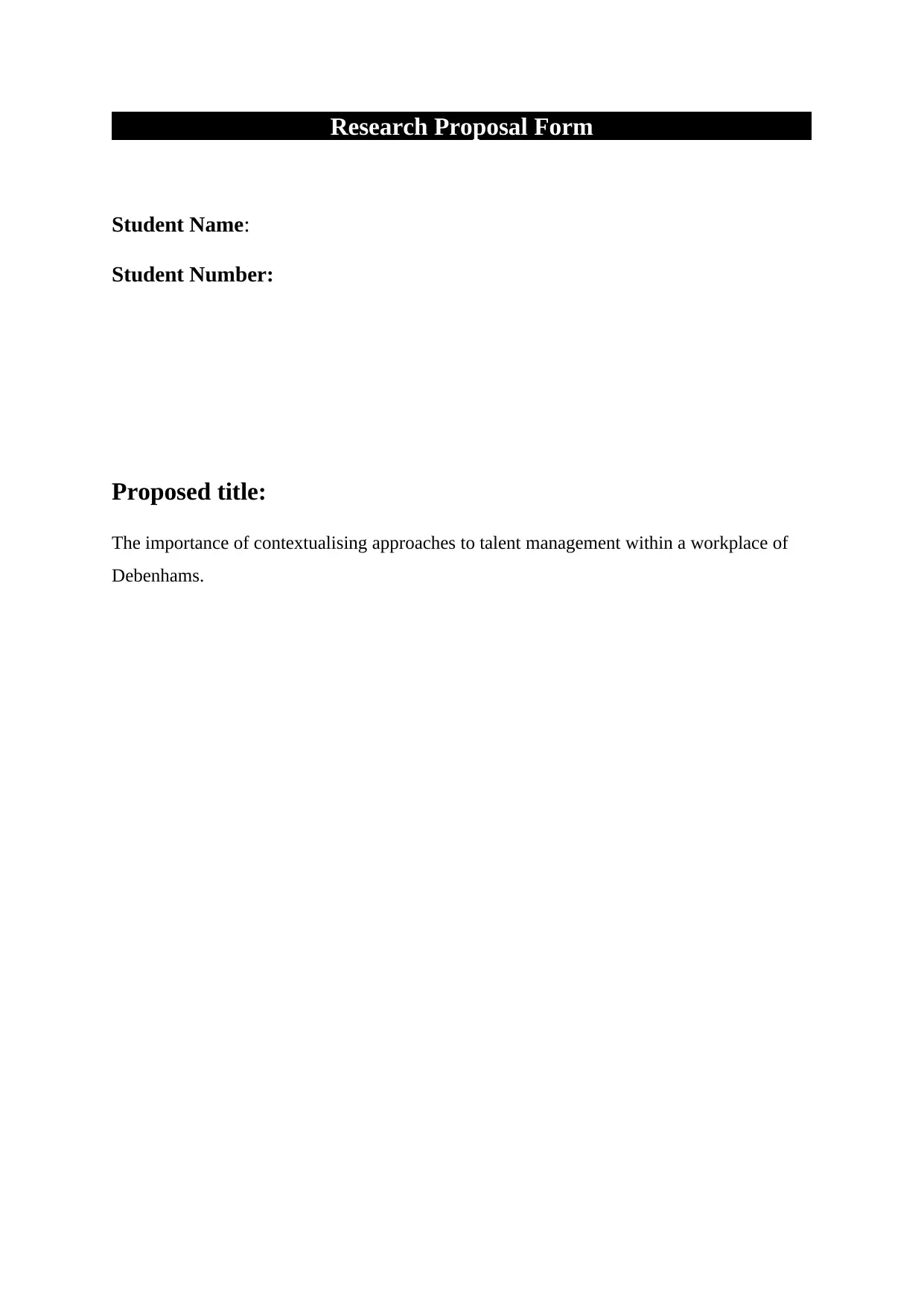
Research Proposal Form
Student Name:
Student Number:
Proposed title:
The importance of contextualising approaches to talent management within a workplace of
Debenhams.
Student Name:
Student Number:
Proposed title:
The importance of contextualising approaches to talent management within a workplace of
Debenhams.
Paraphrase This Document
Need a fresh take? Get an instant paraphrase of this document with our AI Paraphraser
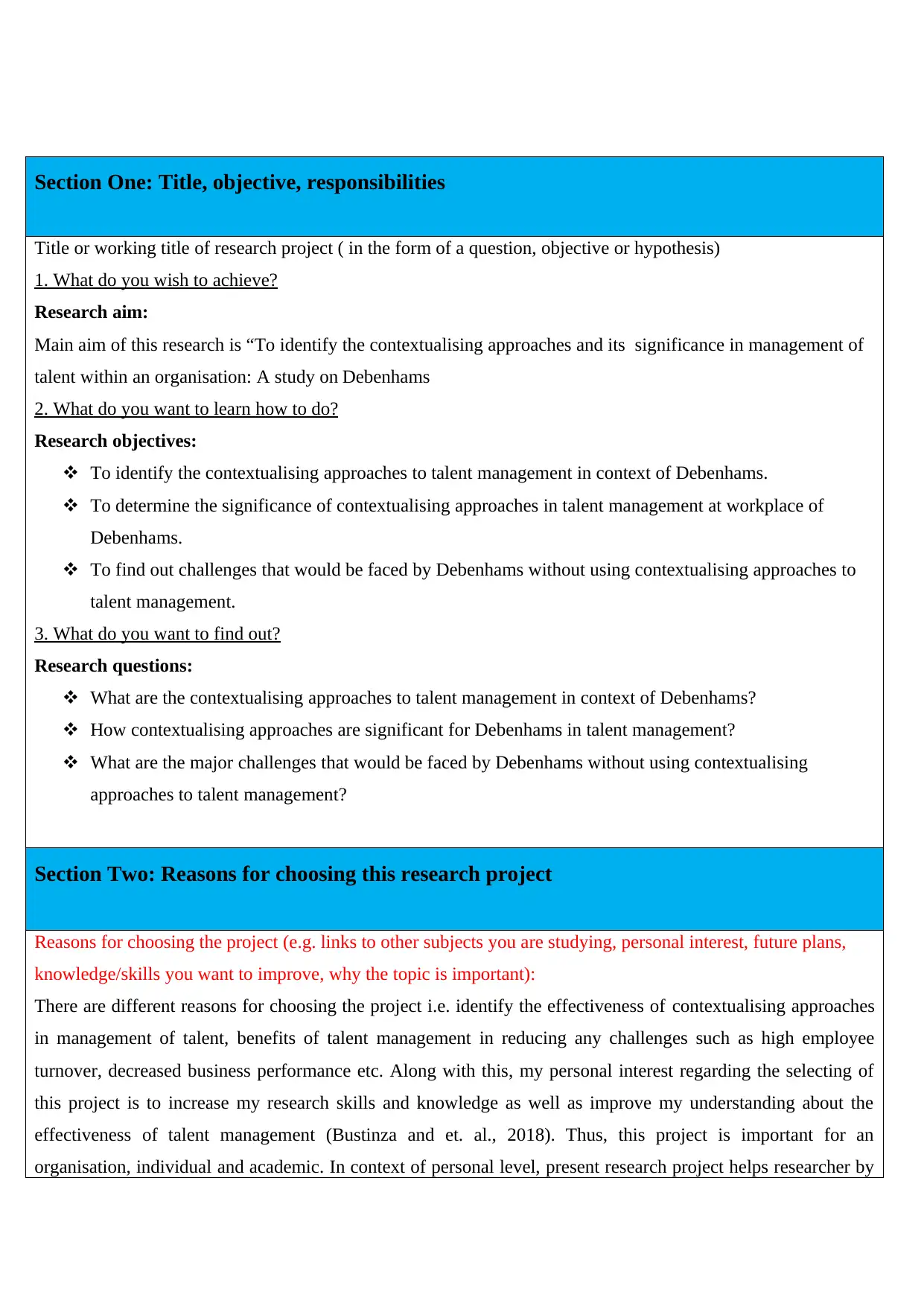
Section One: Title, objective, responsibilities
Title or working title of research project ( in the form of a question, objective or hypothesis)
1. What do you wish to achieve?
Research aim:
Main aim of this research is “To identify the contextualising approaches and its significance in management of
talent within an organisation: A study on Debenhams
2. What do you want to learn how to do?
Research objectives:
To identify the contextualising approaches to talent management in context of Debenhams.
To determine the significance of contextualising approaches in talent management at workplace of
Debenhams.
To find out challenges that would be faced by Debenhams without using contextualising approaches to
talent management.
3. What do you want to find out?
Research questions:
What are the contextualising approaches to talent management in context of Debenhams?
How contextualising approaches are significant for Debenhams in talent management?
What are the major challenges that would be faced by Debenhams without using contextualising
approaches to talent management?
Section Two: Reasons for choosing this research project
Reasons for choosing the project (e.g. links to other subjects you are studying, personal interest, future plans,
knowledge/skills you want to improve, why the topic is important):
There are different reasons for choosing the project i.e. identify the effectiveness of contextualising approaches
in management of talent, benefits of talent management in reducing any challenges such as high employee
turnover, decreased business performance etc. Along with this, my personal interest regarding the selecting of
this project is to increase my research skills and knowledge as well as improve my understanding about the
effectiveness of talent management (Bustinza and et. al., 2018). Thus, this project is important for an
organisation, individual and academic. In context of personal level, present research project helps researcher by
Title or working title of research project ( in the form of a question, objective or hypothesis)
1. What do you wish to achieve?
Research aim:
Main aim of this research is “To identify the contextualising approaches and its significance in management of
talent within an organisation: A study on Debenhams
2. What do you want to learn how to do?
Research objectives:
To identify the contextualising approaches to talent management in context of Debenhams.
To determine the significance of contextualising approaches in talent management at workplace of
Debenhams.
To find out challenges that would be faced by Debenhams without using contextualising approaches to
talent management.
3. What do you want to find out?
Research questions:
What are the contextualising approaches to talent management in context of Debenhams?
How contextualising approaches are significant for Debenhams in talent management?
What are the major challenges that would be faced by Debenhams without using contextualising
approaches to talent management?
Section Two: Reasons for choosing this research project
Reasons for choosing the project (e.g. links to other subjects you are studying, personal interest, future plans,
knowledge/skills you want to improve, why the topic is important):
There are different reasons for choosing the project i.e. identify the effectiveness of contextualising approaches
in management of talent, benefits of talent management in reducing any challenges such as high employee
turnover, decreased business performance etc. Along with this, my personal interest regarding the selecting of
this project is to increase my research skills and knowledge as well as improve my understanding about the
effectiveness of talent management (Bustinza and et. al., 2018). Thus, this project is important for an
organisation, individual and academic. In context of personal level, present research project helps researcher by
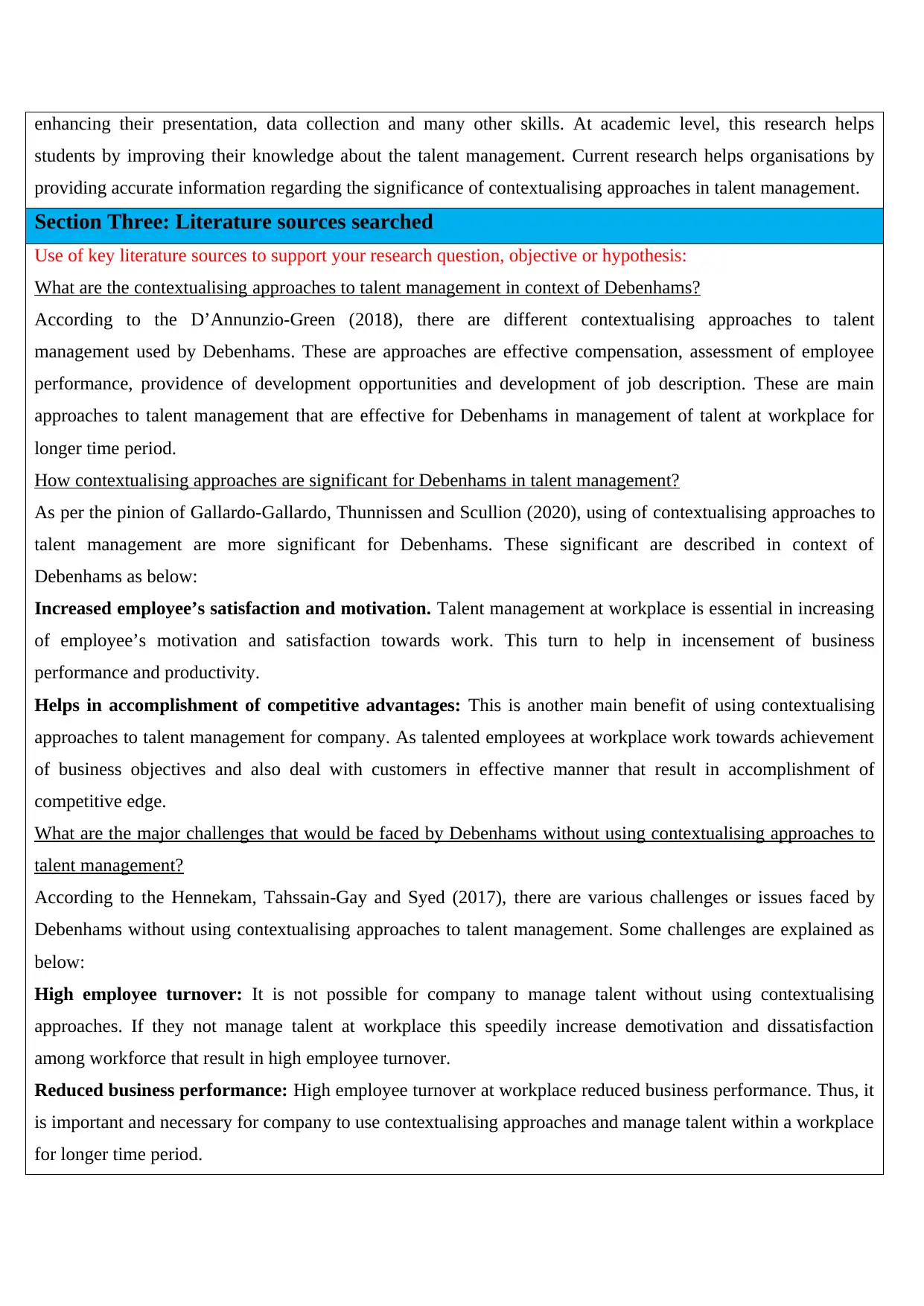
enhancing their presentation, data collection and many other skills. At academic level, this research helps
students by improving their knowledge about the talent management. Current research helps organisations by
providing accurate information regarding the significance of contextualising approaches in talent management.
Section Three: Literature sources searched
Use of key literature sources to support your research question, objective or hypothesis:
What are the contextualising approaches to talent management in context of Debenhams?
According to the D’Annunzio-Green (2018), there are different contextualising approaches to talent
management used by Debenhams. These are approaches are effective compensation, assessment of employee
performance, providence of development opportunities and development of job description. These are main
approaches to talent management that are effective for Debenhams in management of talent at workplace for
longer time period.
How contextualising approaches are significant for Debenhams in talent management?
As per the pinion of Gallardo-Gallardo, Thunnissen and Scullion (2020), using of contextualising approaches to
talent management are more significant for Debenhams. These significant are described in context of
Debenhams as below:
Increased employee’s satisfaction and motivation. Talent management at workplace is essential in increasing
of employee’s motivation and satisfaction towards work. This turn to help in incensement of business
performance and productivity.
Helps in accomplishment of competitive advantages: This is another main benefit of using contextualising
approaches to talent management for company. As talented employees at workplace work towards achievement
of business objectives and also deal with customers in effective manner that result in accomplishment of
competitive edge.
What are the major challenges that would be faced by Debenhams without using contextualising approaches to
talent management?
According to the Hennekam, Tahssain‐Gay and Syed (2017), there are various challenges or issues faced by
Debenhams without using contextualising approaches to talent management. Some challenges are explained as
below:
High employee turnover: It is not possible for company to manage talent without using contextualising
approaches. If they not manage talent at workplace this speedily increase demotivation and dissatisfaction
among workforce that result in high employee turnover.
Reduced business performance: High employee turnover at workplace reduced business performance. Thus, it
is important and necessary for company to use contextualising approaches and manage talent within a workplace
for longer time period.
students by improving their knowledge about the talent management. Current research helps organisations by
providing accurate information regarding the significance of contextualising approaches in talent management.
Section Three: Literature sources searched
Use of key literature sources to support your research question, objective or hypothesis:
What are the contextualising approaches to talent management in context of Debenhams?
According to the D’Annunzio-Green (2018), there are different contextualising approaches to talent
management used by Debenhams. These are approaches are effective compensation, assessment of employee
performance, providence of development opportunities and development of job description. These are main
approaches to talent management that are effective for Debenhams in management of talent at workplace for
longer time period.
How contextualising approaches are significant for Debenhams in talent management?
As per the pinion of Gallardo-Gallardo, Thunnissen and Scullion (2020), using of contextualising approaches to
talent management are more significant for Debenhams. These significant are described in context of
Debenhams as below:
Increased employee’s satisfaction and motivation. Talent management at workplace is essential in increasing
of employee’s motivation and satisfaction towards work. This turn to help in incensement of business
performance and productivity.
Helps in accomplishment of competitive advantages: This is another main benefit of using contextualising
approaches to talent management for company. As talented employees at workplace work towards achievement
of business objectives and also deal with customers in effective manner that result in accomplishment of
competitive edge.
What are the major challenges that would be faced by Debenhams without using contextualising approaches to
talent management?
According to the Hennekam, Tahssain‐Gay and Syed (2017), there are various challenges or issues faced by
Debenhams without using contextualising approaches to talent management. Some challenges are explained as
below:
High employee turnover: It is not possible for company to manage talent without using contextualising
approaches. If they not manage talent at workplace this speedily increase demotivation and dissatisfaction
among workforce that result in high employee turnover.
Reduced business performance: High employee turnover at workplace reduced business performance. Thus, it
is important and necessary for company to use contextualising approaches and manage talent within a workplace
for longer time period.
⊘ This is a preview!⊘
Do you want full access?
Subscribe today to unlock all pages.

Trusted by 1+ million students worldwide
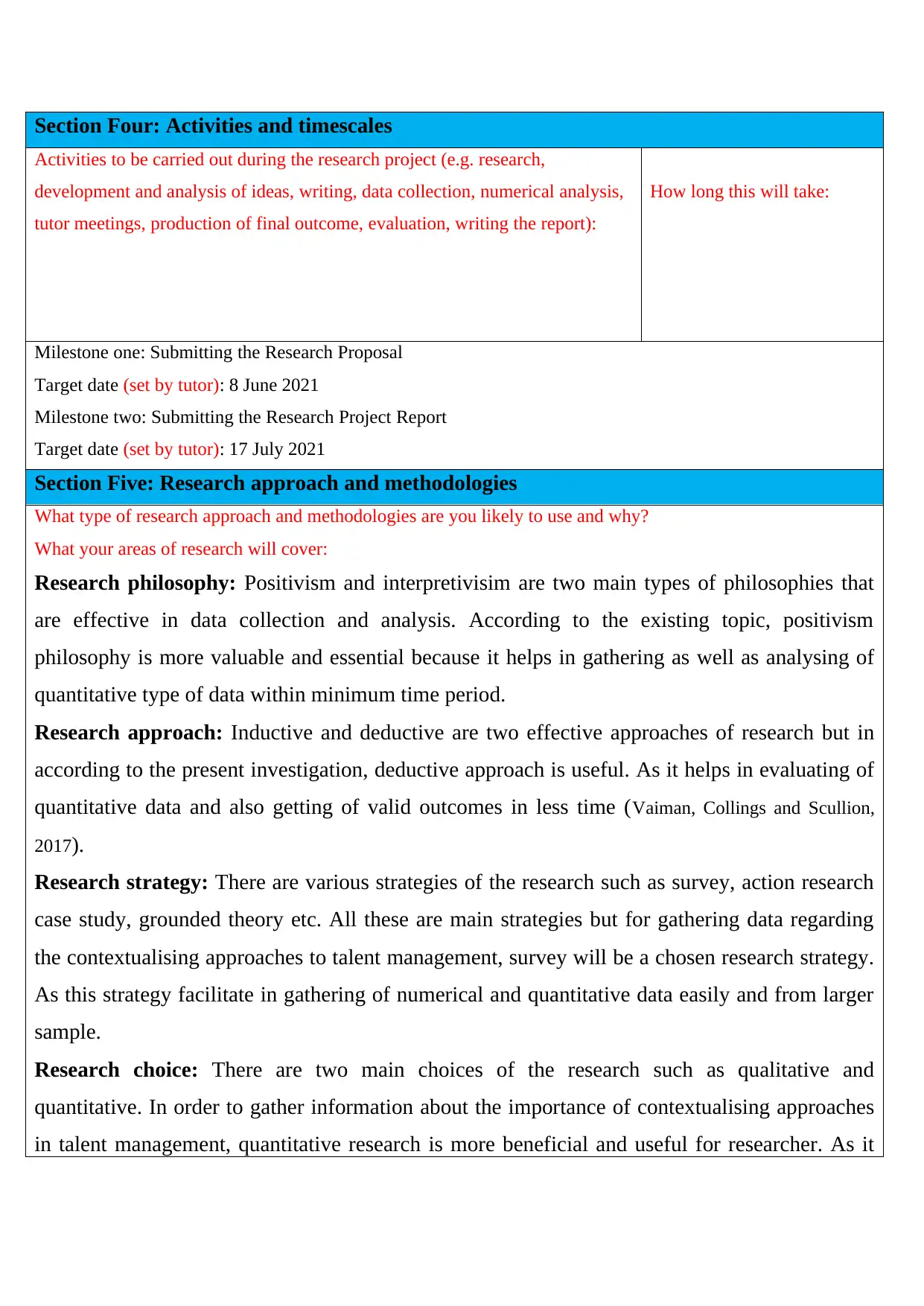
Section Four: Activities and timescales
Activities to be carried out during the research project (e.g. research,
development and analysis of ideas, writing, data collection, numerical analysis,
tutor meetings, production of final outcome, evaluation, writing the report):
How long this will take:
Milestone one: Submitting the Research Proposal
Target date (set by tutor): 8 June 2021
Milestone two: Submitting the Research Project Report
Target date (set by tutor): 17 July 2021
Section Five: Research approach and methodologies
What type of research approach and methodologies are you likely to use and why?
What your areas of research will cover:
Research philosophy: Positivism and interpretivisim are two main types of philosophies that
are effective in data collection and analysis. According to the existing topic, positivism
philosophy is more valuable and essential because it helps in gathering as well as analysing of
quantitative type of data within minimum time period.
Research approach: Inductive and deductive are two effective approaches of research but in
according to the present investigation, deductive approach is useful. As it helps in evaluating of
quantitative data and also getting of valid outcomes in less time (Vaiman, Collings and Scullion,
2017).
Research strategy: There are various strategies of the research such as survey, action research
case study, grounded theory etc. All these are main strategies but for gathering data regarding
the contextualising approaches to talent management, survey will be a chosen research strategy.
As this strategy facilitate in gathering of numerical and quantitative data easily and from larger
sample.
Research choice: There are two main choices of the research such as qualitative and
quantitative. In order to gather information about the importance of contextualising approaches
in talent management, quantitative research is more beneficial and useful for researcher. As it
Activities to be carried out during the research project (e.g. research,
development and analysis of ideas, writing, data collection, numerical analysis,
tutor meetings, production of final outcome, evaluation, writing the report):
How long this will take:
Milestone one: Submitting the Research Proposal
Target date (set by tutor): 8 June 2021
Milestone two: Submitting the Research Project Report
Target date (set by tutor): 17 July 2021
Section Five: Research approach and methodologies
What type of research approach and methodologies are you likely to use and why?
What your areas of research will cover:
Research philosophy: Positivism and interpretivisim are two main types of philosophies that
are effective in data collection and analysis. According to the existing topic, positivism
philosophy is more valuable and essential because it helps in gathering as well as analysing of
quantitative type of data within minimum time period.
Research approach: Inductive and deductive are two effective approaches of research but in
according to the present investigation, deductive approach is useful. As it helps in evaluating of
quantitative data and also getting of valid outcomes in less time (Vaiman, Collings and Scullion,
2017).
Research strategy: There are various strategies of the research such as survey, action research
case study, grounded theory etc. All these are main strategies but for gathering data regarding
the contextualising approaches to talent management, survey will be a chosen research strategy.
As this strategy facilitate in gathering of numerical and quantitative data easily and from larger
sample.
Research choice: There are two main choices of the research such as qualitative and
quantitative. In order to gather information about the importance of contextualising approaches
in talent management, quantitative research is more beneficial and useful for researcher. As it
Paraphrase This Document
Need a fresh take? Get an instant paraphrase of this document with our AI Paraphraser
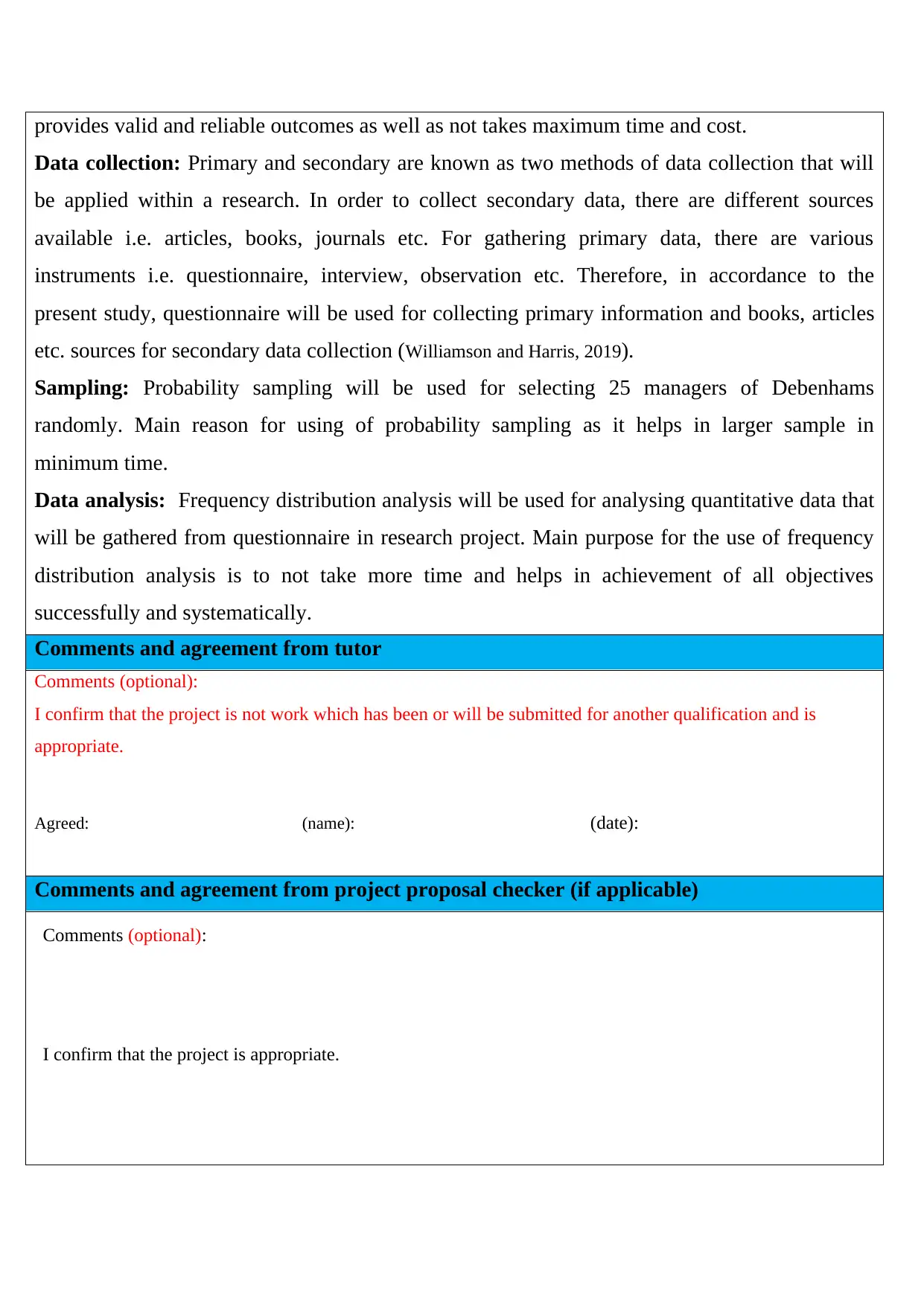
provides valid and reliable outcomes as well as not takes maximum time and cost.
Data collection: Primary and secondary are known as two methods of data collection that will
be applied within a research. In order to collect secondary data, there are different sources
available i.e. articles, books, journals etc. For gathering primary data, there are various
instruments i.e. questionnaire, interview, observation etc. Therefore, in accordance to the
present study, questionnaire will be used for collecting primary information and books, articles
etc. sources for secondary data collection (Williamson and Harris, 2019).
Sampling: Probability sampling will be used for selecting 25 managers of Debenhams
randomly. Main reason for using of probability sampling as it helps in larger sample in
minimum time.
Data analysis: Frequency distribution analysis will be used for analysing quantitative data that
will be gathered from questionnaire in research project. Main purpose for the use of frequency
distribution analysis is to not take more time and helps in achievement of all objectives
successfully and systematically.
Comments and agreement from tutor
Comments (optional):
I confirm that the project is not work which has been or will be submitted for another qualification and is
appropriate.
Agreed: (name): (date):
Comments and agreement from project proposal checker (if applicable)
Comments (optional):
I confirm that the project is appropriate.
Data collection: Primary and secondary are known as two methods of data collection that will
be applied within a research. In order to collect secondary data, there are different sources
available i.e. articles, books, journals etc. For gathering primary data, there are various
instruments i.e. questionnaire, interview, observation etc. Therefore, in accordance to the
present study, questionnaire will be used for collecting primary information and books, articles
etc. sources for secondary data collection (Williamson and Harris, 2019).
Sampling: Probability sampling will be used for selecting 25 managers of Debenhams
randomly. Main reason for using of probability sampling as it helps in larger sample in
minimum time.
Data analysis: Frequency distribution analysis will be used for analysing quantitative data that
will be gathered from questionnaire in research project. Main purpose for the use of frequency
distribution analysis is to not take more time and helps in achievement of all objectives
successfully and systematically.
Comments and agreement from tutor
Comments (optional):
I confirm that the project is not work which has been or will be submitted for another qualification and is
appropriate.
Agreed: (name): (date):
Comments and agreement from project proposal checker (if applicable)
Comments (optional):
I confirm that the project is appropriate.
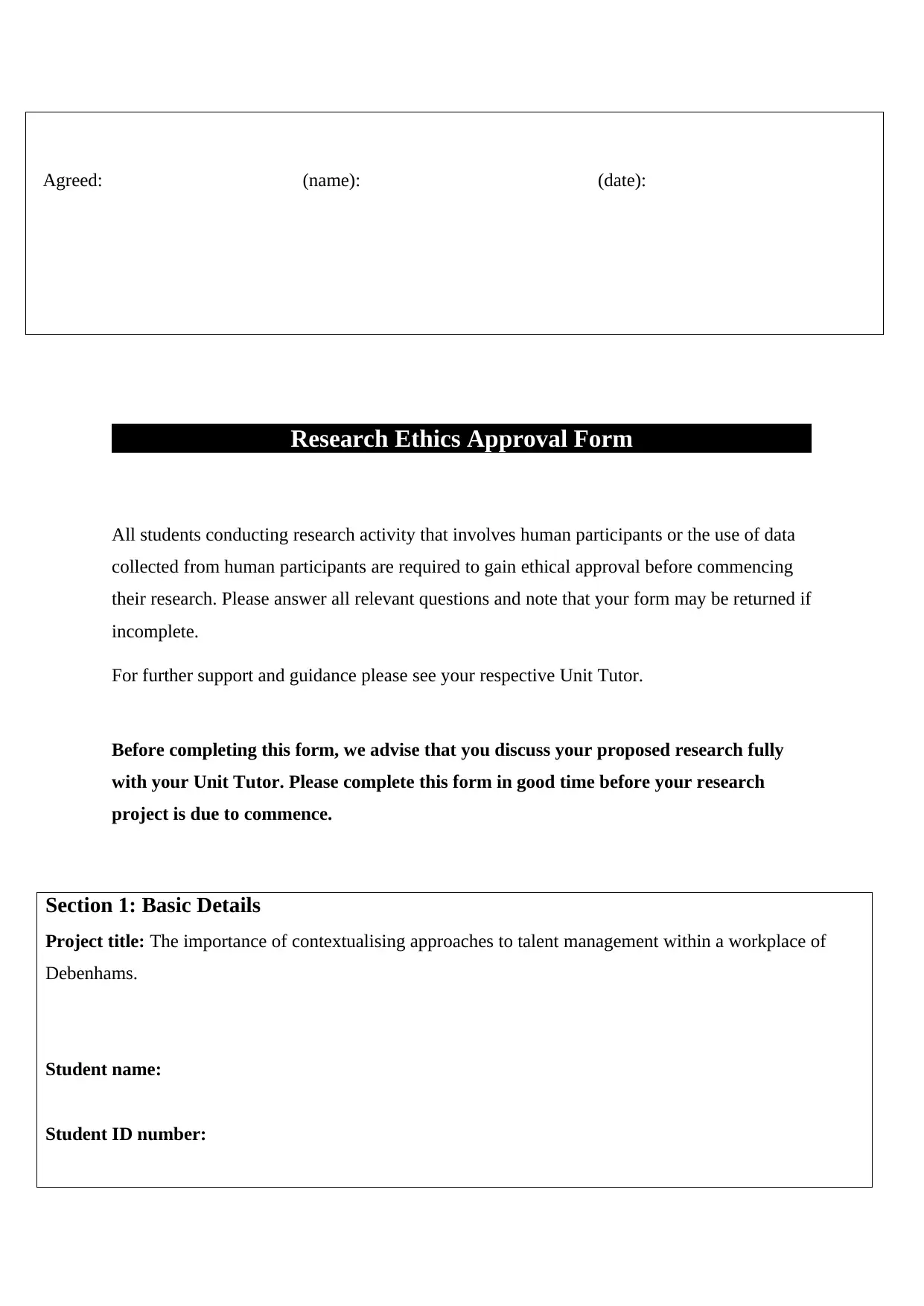
Agreed: (name): (date):
Research Ethics Approval Form
All students conducting research activity that involves human participants or the use of data
collected from human participants are required to gain ethical approval before commencing
their research. Please answer all relevant questions and note that your form may be returned if
incomplete.
For further support and guidance please see your respective Unit Tutor.
Before completing this form, we advise that you discuss your proposed research fully
with your Unit Tutor. Please complete this form in good time before your research
project is due to commence.
Section 1: Basic Details
Project title: The importance of contextualising approaches to talent management within a workplace of
Debenhams.
Student name:
Student ID number:
Research Ethics Approval Form
All students conducting research activity that involves human participants or the use of data
collected from human participants are required to gain ethical approval before commencing
their research. Please answer all relevant questions and note that your form may be returned if
incomplete.
For further support and guidance please see your respective Unit Tutor.
Before completing this form, we advise that you discuss your proposed research fully
with your Unit Tutor. Please complete this form in good time before your research
project is due to commence.
Section 1: Basic Details
Project title: The importance of contextualising approaches to talent management within a workplace of
Debenhams.
Student name:
Student ID number:
⊘ This is a preview!⊘
Do you want full access?
Subscribe today to unlock all pages.

Trusted by 1+ million students worldwide
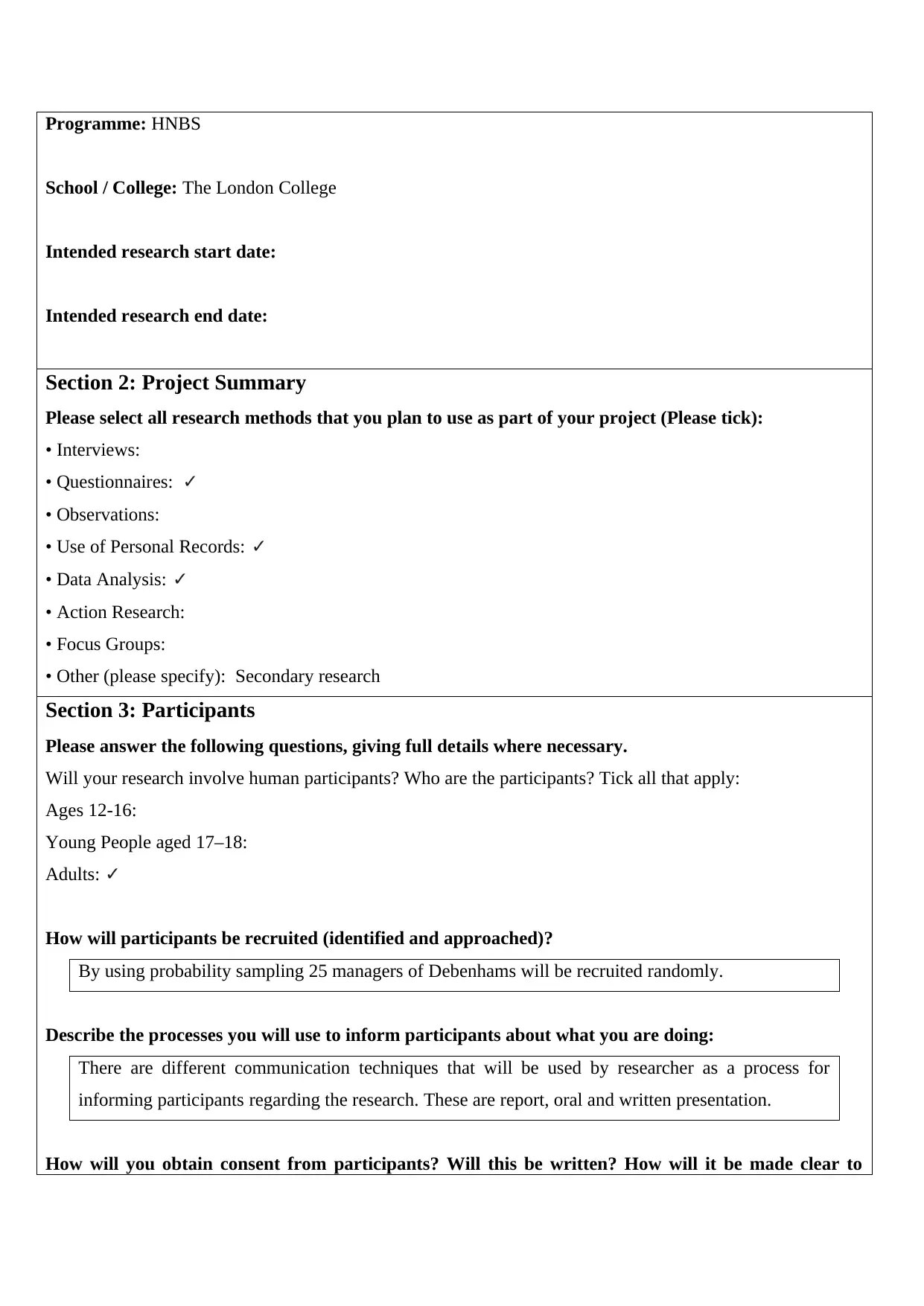
Programme: HNBS
School / College: The London College
Intended research start date:
Intended research end date:
Section 2: Project Summary
Please select all research methods that you plan to use as part of your project (Please tick):
• Interviews:
• Questionnaires: ✓
• Observations:
• Use of Personal Records: ✓
• Data Analysis: ✓
• Action Research:
• Focus Groups:
• Other (please specify): Secondary research
Section 3: Participants
Please answer the following questions, giving full details where necessary.
Will your research involve human participants? Who are the participants? Tick all that apply:
Ages 12-16:
Young People aged 17–18:
Adults: ✓
How will participants be recruited (identified and approached)?
By using probability sampling 25 managers of Debenhams will be recruited randomly.
Describe the processes you will use to inform participants about what you are doing:
There are different communication techniques that will be used by researcher as a process for
informing participants regarding the research. These are report, oral and written presentation.
How will you obtain consent from participants? Will this be written? How will it be made clear to
School / College: The London College
Intended research start date:
Intended research end date:
Section 2: Project Summary
Please select all research methods that you plan to use as part of your project (Please tick):
• Interviews:
• Questionnaires: ✓
• Observations:
• Use of Personal Records: ✓
• Data Analysis: ✓
• Action Research:
• Focus Groups:
• Other (please specify): Secondary research
Section 3: Participants
Please answer the following questions, giving full details where necessary.
Will your research involve human participants? Who are the participants? Tick all that apply:
Ages 12-16:
Young People aged 17–18:
Adults: ✓
How will participants be recruited (identified and approached)?
By using probability sampling 25 managers of Debenhams will be recruited randomly.
Describe the processes you will use to inform participants about what you are doing:
There are different communication techniques that will be used by researcher as a process for
informing participants regarding the research. These are report, oral and written presentation.
How will you obtain consent from participants? Will this be written? How will it be made clear to
Paraphrase This Document
Need a fresh take? Get an instant paraphrase of this document with our AI Paraphraser
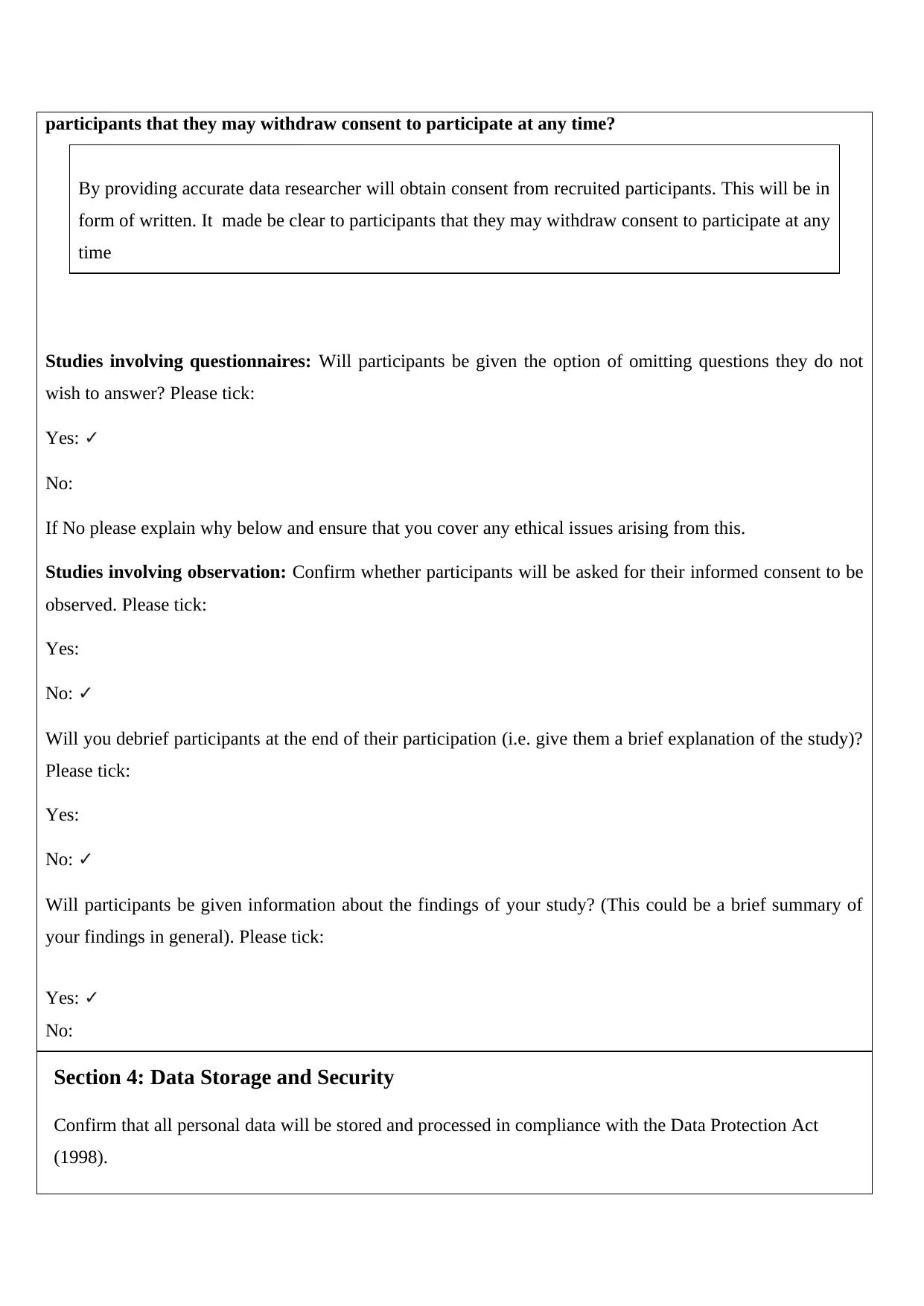
participants that they may withdraw consent to participate at any time?
By providing accurate data researcher will obtain consent from recruited participants. This will be in
form of written. It made be clear to participants that they may withdraw consent to participate at any
time
Studies involving questionnaires: Will participants be given the option of omitting questions they do not
wish to answer? Please tick:
Yes: ✓
No:
If No please explain why below and ensure that you cover any ethical issues arising from this.
Studies involving observation: Confirm whether participants will be asked for their informed consent to be
observed. Please tick:
Yes:
No: ✓
Will you debrief participants at the end of their participation (i.e. give them a brief explanation of the study)?
Please tick:
Yes:
No: ✓
Will participants be given information about the findings of your study? (This could be a brief summary of
your findings in general). Please tick:
Yes: ✓
No:
Section 4: Data Storage and Security
Confirm that all personal data will be stored and processed in compliance with the Data Protection Act
(1998).
By providing accurate data researcher will obtain consent from recruited participants. This will be in
form of written. It made be clear to participants that they may withdraw consent to participate at any
time
Studies involving questionnaires: Will participants be given the option of omitting questions they do not
wish to answer? Please tick:
Yes: ✓
No:
If No please explain why below and ensure that you cover any ethical issues arising from this.
Studies involving observation: Confirm whether participants will be asked for their informed consent to be
observed. Please tick:
Yes:
No: ✓
Will you debrief participants at the end of their participation (i.e. give them a brief explanation of the study)?
Please tick:
Yes:
No: ✓
Will participants be given information about the findings of your study? (This could be a brief summary of
your findings in general). Please tick:
Yes: ✓
No:
Section 4: Data Storage and Security
Confirm that all personal data will be stored and processed in compliance with the Data Protection Act
(1998).
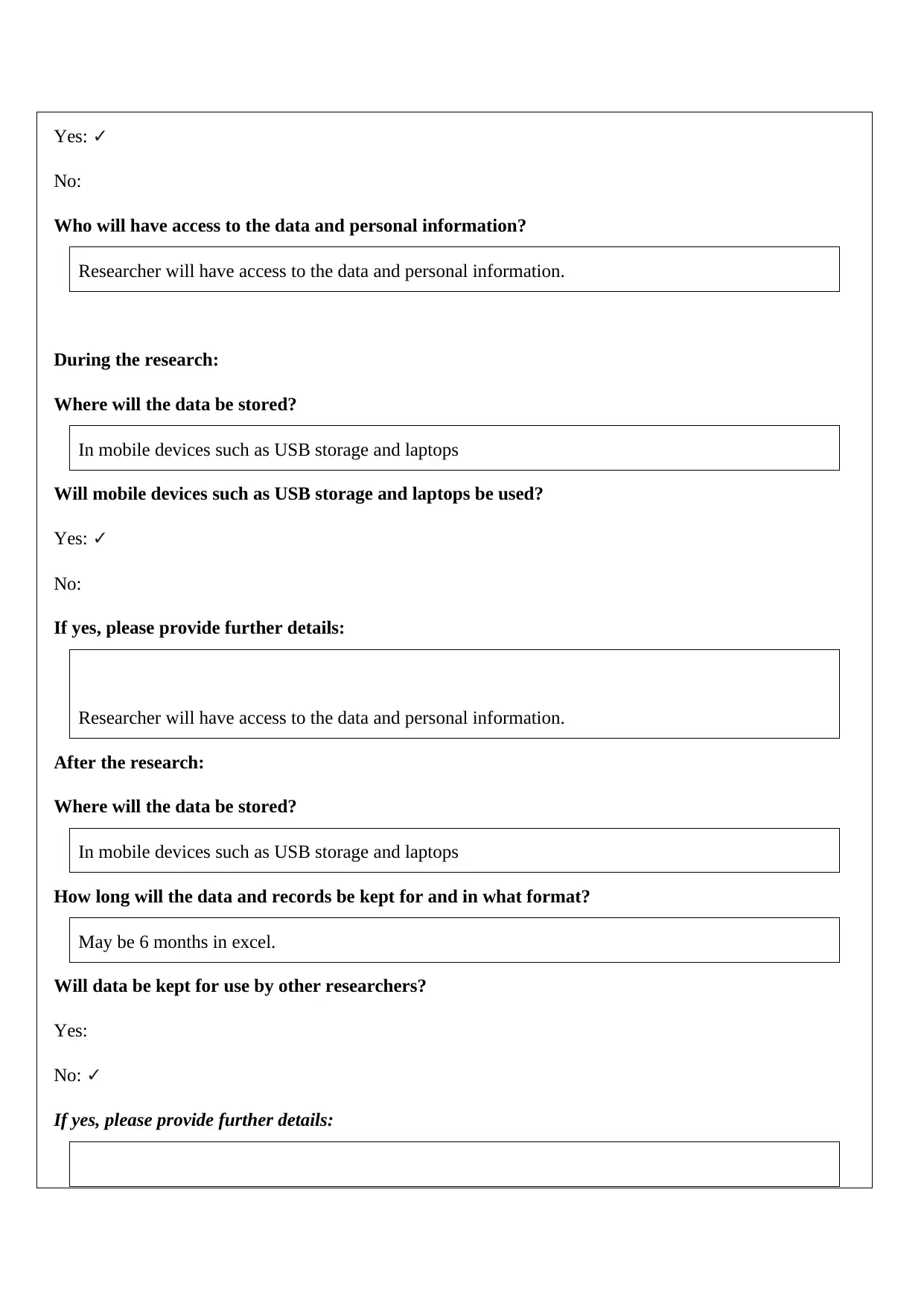
Yes: ✓
No:
Who will have access to the data and personal information?
Researcher will have access to the data and personal information.
During the research:
Where will the data be stored?
In mobile devices such as USB storage and laptops
Will mobile devices such as USB storage and laptops be used?
Yes: ✓
No:
If yes, please provide further details:
Researcher will have access to the data and personal information.
After the research:
Where will the data be stored?
In mobile devices such as USB storage and laptops
How long will the data and records be kept for and in what format?
May be 6 months in excel.
Will data be kept for use by other researchers?
Yes:
No: ✓
If yes, please provide further details:
No:
Who will have access to the data and personal information?
Researcher will have access to the data and personal information.
During the research:
Where will the data be stored?
In mobile devices such as USB storage and laptops
Will mobile devices such as USB storage and laptops be used?
Yes: ✓
No:
If yes, please provide further details:
Researcher will have access to the data and personal information.
After the research:
Where will the data be stored?
In mobile devices such as USB storage and laptops
How long will the data and records be kept for and in what format?
May be 6 months in excel.
Will data be kept for use by other researchers?
Yes:
No: ✓
If yes, please provide further details:
⊘ This is a preview!⊘
Do you want full access?
Subscribe today to unlock all pages.

Trusted by 1+ million students worldwide
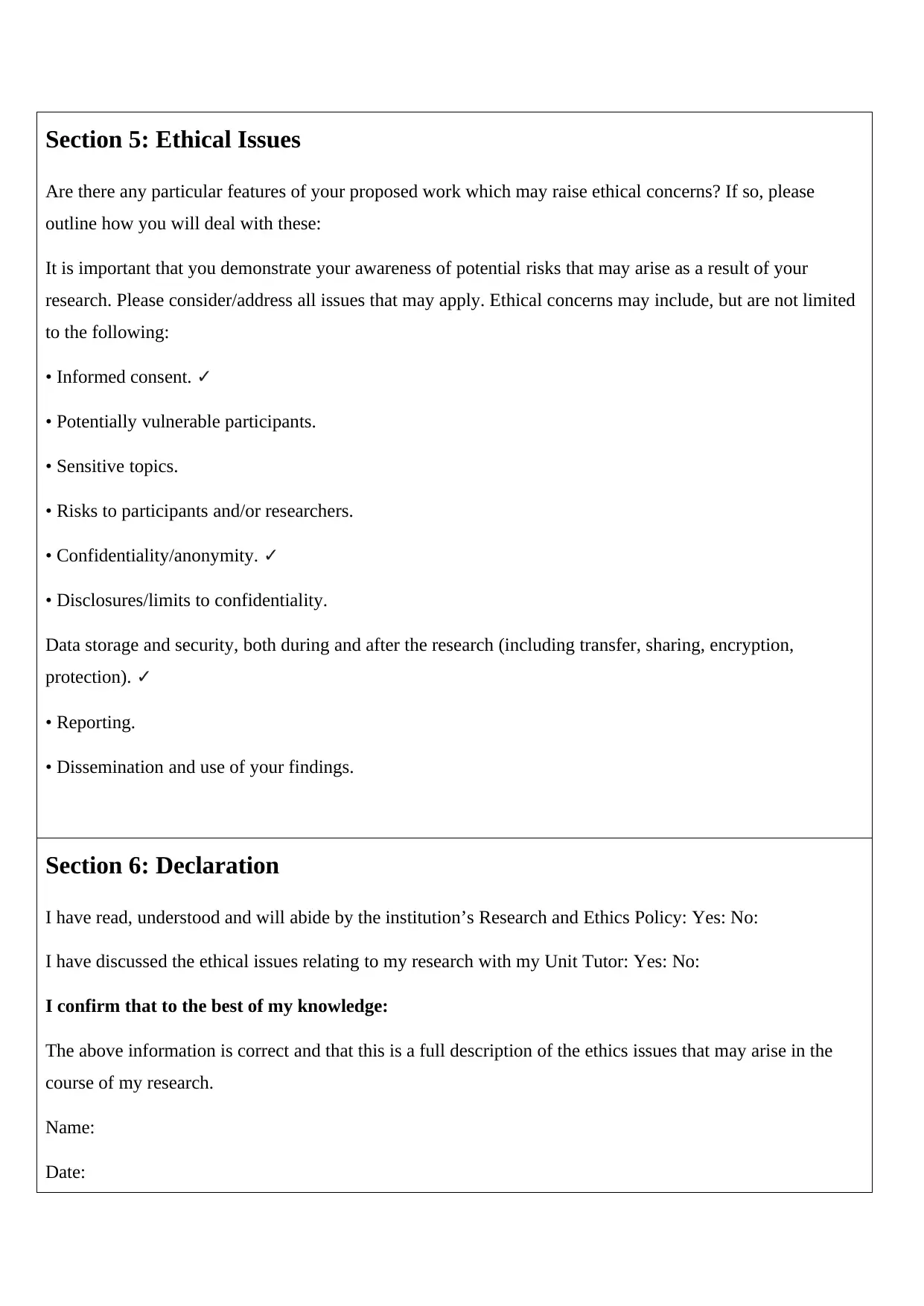
Section 5: Ethical Issues
Are there any particular features of your proposed work which may raise ethical concerns? If so, please
outline how you will deal with these:
It is important that you demonstrate your awareness of potential risks that may arise as a result of your
research. Please consider/address all issues that may apply. Ethical concerns may include, but are not limited
to the following:
• Informed consent. ✓
• Potentially vulnerable participants.
• Sensitive topics.
• Risks to participants and/or researchers.
• Confidentiality/anonymity. ✓
• Disclosures/limits to confidentiality.
Data storage and security, both during and after the research (including transfer, sharing, encryption,
protection). ✓
• Reporting.
• Dissemination and use of your findings.
Section 6: Declaration
I have read, understood and will abide by the institution’s Research and Ethics Policy: Yes: No:
I have discussed the ethical issues relating to my research with my Unit Tutor: Yes: No:
I confirm that to the best of my knowledge:
The above information is correct and that this is a full description of the ethics issues that may arise in the
course of my research.
Name:
Date:
Are there any particular features of your proposed work which may raise ethical concerns? If so, please
outline how you will deal with these:
It is important that you demonstrate your awareness of potential risks that may arise as a result of your
research. Please consider/address all issues that may apply. Ethical concerns may include, but are not limited
to the following:
• Informed consent. ✓
• Potentially vulnerable participants.
• Sensitive topics.
• Risks to participants and/or researchers.
• Confidentiality/anonymity. ✓
• Disclosures/limits to confidentiality.
Data storage and security, both during and after the research (including transfer, sharing, encryption,
protection). ✓
• Reporting.
• Dissemination and use of your findings.
Section 6: Declaration
I have read, understood and will abide by the institution’s Research and Ethics Policy: Yes: No:
I have discussed the ethical issues relating to my research with my Unit Tutor: Yes: No:
I confirm that to the best of my knowledge:
The above information is correct and that this is a full description of the ethics issues that may arise in the
course of my research.
Name:
Date:
Paraphrase This Document
Need a fresh take? Get an instant paraphrase of this document with our AI Paraphraser

Please submit your completed form to Moodle
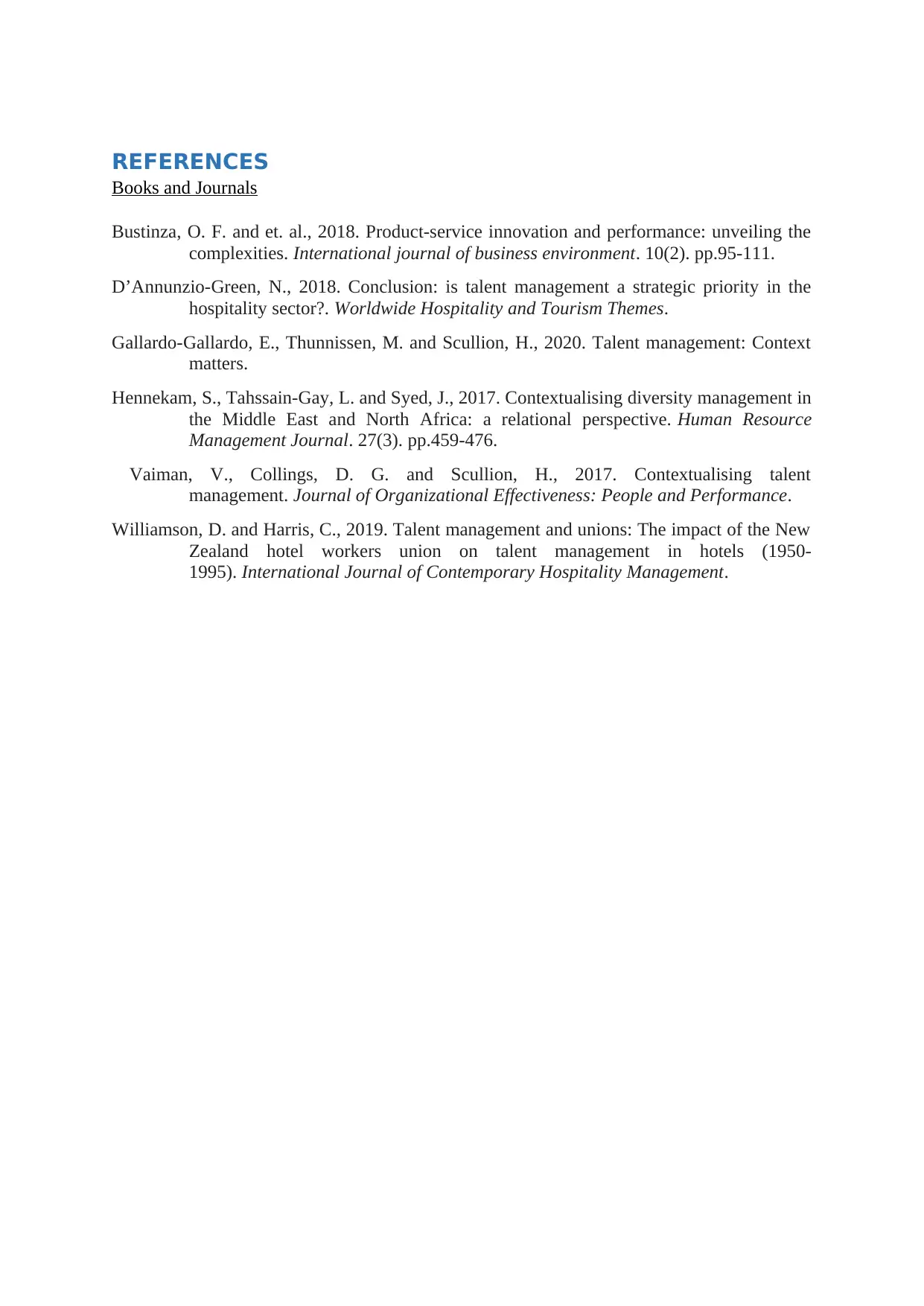
REFERENCES
Books and Journals
Bustinza, O. F. and et. al., 2018. Product-service innovation and performance: unveiling the
complexities. International journal of business environment. 10(2). pp.95-111.
D’Annunzio-Green, N., 2018. Conclusion: is talent management a strategic priority in the
hospitality sector?. Worldwide Hospitality and Tourism Themes.
Gallardo-Gallardo, E., Thunnissen, M. and Scullion, H., 2020. Talent management: Context
matters.
Hennekam, S., Tahssain‐Gay, L. and Syed, J., 2017. Contextualising diversity management in
the Middle East and North Africa: a relational perspective. Human Resource
Management Journal. 27(3). pp.459-476.
Vaiman, V., Collings, D. G. and Scullion, H., 2017. Contextualising talent
management. Journal of Organizational Effectiveness: People and Performance.
Williamson, D. and Harris, C., 2019. Talent management and unions: The impact of the New
Zealand hotel workers union on talent management in hotels (1950-
1995). International Journal of Contemporary Hospitality Management.
Books and Journals
Bustinza, O. F. and et. al., 2018. Product-service innovation and performance: unveiling the
complexities. International journal of business environment. 10(2). pp.95-111.
D’Annunzio-Green, N., 2018. Conclusion: is talent management a strategic priority in the
hospitality sector?. Worldwide Hospitality and Tourism Themes.
Gallardo-Gallardo, E., Thunnissen, M. and Scullion, H., 2020. Talent management: Context
matters.
Hennekam, S., Tahssain‐Gay, L. and Syed, J., 2017. Contextualising diversity management in
the Middle East and North Africa: a relational perspective. Human Resource
Management Journal. 27(3). pp.459-476.
Vaiman, V., Collings, D. G. and Scullion, H., 2017. Contextualising talent
management. Journal of Organizational Effectiveness: People and Performance.
Williamson, D. and Harris, C., 2019. Talent management and unions: The impact of the New
Zealand hotel workers union on talent management in hotels (1950-
1995). International Journal of Contemporary Hospitality Management.
⊘ This is a preview!⊘
Do you want full access?
Subscribe today to unlock all pages.

Trusted by 1+ million students worldwide
1 out of 12
Related Documents
Your All-in-One AI-Powered Toolkit for Academic Success.
+13062052269
info@desklib.com
Available 24*7 on WhatsApp / Email
![[object Object]](/_next/static/media/star-bottom.7253800d.svg)
Unlock your academic potential
Copyright © 2020–2026 A2Z Services. All Rights Reserved. Developed and managed by ZUCOL.




